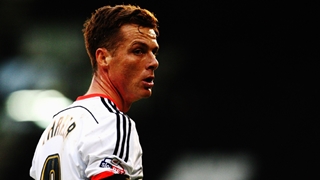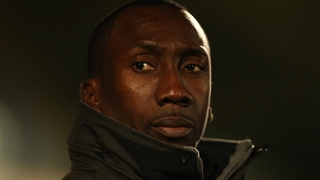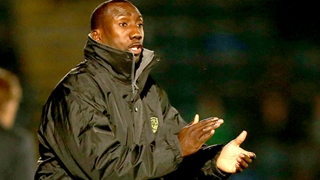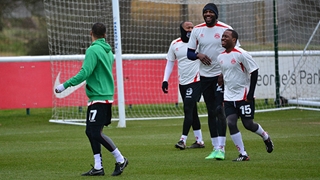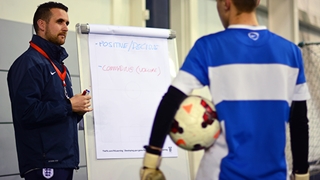
In a parallel career, Tim Dittmer thought about speaking to a psychologist.
He was a promising goalkeeper who came through Liverpool’s academy, went on to play 150 games for Vauxhall Motors in the Conference and Conference North and ended up at Bradford City as player coach.
But a life inside the 18-yard box can be a lonely one.
Advanced Youth Award
* Youth equivalent of the UEFA A Licence
* Works with elite coaches at 5-11, 12-16 and 17-21 age-groups
*Takes nine months to complete
"Back then it was a case of just save it and kick it. And if I made a mistake then I was anxious to make the next decision right," he said.
"So I might go chasing the game and trying to play catch-up, rather than doing what was natural and easy.
"I thought about speaking with a psychologist but I didn’t know how to do it."
In his main career as a goalkeeping coach and coach educator, Dittmer is dedicated to making sure young shot-stoppers are given the psychological tools to cope in their role.
Still only 30 but vastly experienced, Dittmer joined The FA in 2013, after spells as lead goalkeeping coach at Bradford City and then Manchester City, where he worked across the full spectrum of goalkeepers at the club.
Working at St. George’s Park, he helps elite coaches to move with the times and prepare goalkeepers for the pressure-cooker environment of the Premier League.
He said: "I got qualified coaching-wise really young and went down that path. Once I got to Manchester City I had to stop playing – there just wasn’t time.
"But coaching has always done it for me. Now the fact that I am able to help coaches as well as players is great."
This week, Dittmer has been delivering a course as part of The FA’s Advanced Youth Award, designed to improve youth coaching at elite level.
Like all player development courses at the National Football Centre, it is built around the Four Corner Model, where equal focus is placed on the technical, physical, social and psychological needs of the player.
And Dittmer feels it is that last category has been traditionally overlooked.
"The psychological corner for the goalkeeper is massively important," he said.

Tim Dittmer says keepers in this country are usually adept at technical skills - but the psychological side is often overlooked
"With top-level players, and the high-level coaches we are working with, sometimes technical and tactical skills are already of a very high standard.
"But what stops a player going up to that next level might be a lack of a psychological or social skill.
"Something may have been overlooked in the past, or too much emphasis has been made on the technical or tactical."
He added: "As a 'keeper you’re very often in an area with very few players around you.
"You have a 1D vision of the game with all the play in front of you.
"Sometimes you don’t see the ball for a long time and that can ask questions of your concentration."
This week Dittmer is helping coaches develop programmes to enhance a player’s psychological skills.
"Turning all those things into training is key. How do you work on concentration on the pitch?" he said.
"You might ask a 'keeper to communicate. Well what does that mean, and how do you get them to do it?
"You want them to be committed and brave but how do you produce those traits?"
For example?
"Straight away you have to connect with them and make them want to do it and enjoy it," he said.
"You have to find a way of stressing them mentally. It might be asking them to recognise a visual cue before you ask for a pass.
"So you get them used to scanning, looking where they want to go before they receive the pass."
Dittmer feels that, in the grand scheme of things, the needs of a young goalkeeper are often overlooked.
"I’m not sure how conducive the system is for developing a goalkeeper over time," he said.
"Goalkeepers are often given a two-year scholarship deal and then released at 18 when they are deemed not good enough.
"So they are being released at a time when they should be gaining crucial experience to help their development."
More often than not, talented young English 'keepers are overlooked in favour of older, more proven players.
"A manager in the Premier League might only be allowed to lose three games because if they lose a fourth they will be out of the door," he said.
"So with goalkeepers they need to know what they are going to get, this is completely understandable.
"I think if coaches knew that their goalkeepers were being coached well on the psychological side then they might be more likely to give them a chance."
Dittmer says that this approach, coupled with an opportunity to play first-team football on loan or otherwise, can be a recipe for success.
"Thibaut Courtois at Chelsea is a great example – going to Athletico for three seasons before coming back to Chelsea," he said.
"And then there is the experience that he gained at Genk in the first team there at a young age.
“We want goalkeepers to be calm, confident and outgoing, but how do get them to be like that?”
Tim Dittmer
"Different environments, different coaching and different culture…and he has thrived on that.
"He comes back to Chelsea and he has to deal with the megastars that are there and he does really well.
"And now he is one of the leading goalkeepers. It’s a great story."
Dittmer hopes that soon there will be similar tales of success for future England goalkeepers.
"This course definitely equips people to understand the individual more," he said.
"We want goalkeepers to be calm and confident and outgoing, but how do get them to be like that?
"We give them lots of advice on how to catch it and kick it and punch it, but how do we make them positive individuals? Or do we just hope that they are?"







